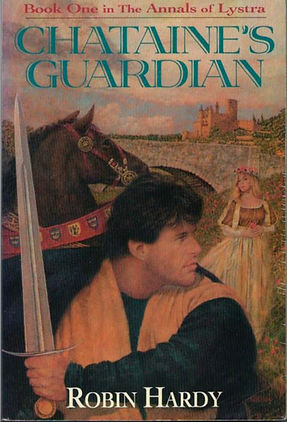Robin Hardy's Abbey Lands
Robin Responds to Reviews
I almost never comment on reviews of my books on Amazon—whatever I say can be taken the wrong way. But since some of their remarks apply to my latest books, I thought to share a few here. Now, I am appreciative of everyone who reviews my books, even critically. So that I can be frank without appearing to badmouth anyone, I'm not linking their comments.
Of Chataine's Guardian, one reviewer says, "I want to live in Lystra." That is exactly what I strive for—to create a lively, interesting, unpredictable but satisfying reality that adds a dimension to our lives here and now. I don't always achieve that. It doesn't hinge on just the plot, but on the nature of the characters: how real are they? Can we understand them? How much can we share their experiences?—more than that, how much do we want to?
Another reviewer says, "Fantastic reading for ages 8-15! A childhood favourite." Stop, please. This is not a children's book. None of my books are written for children, and it has nothing to do with sex scenes. Children's books require a different perspective than what I offer. And I have been burned by critics who insist that all Christian fiction be suitable for children. No. Christian adults must deal with an unChristian world, and I want my protagonists to show how it's done.
Finally, another says, "Shallow and trite. Deirdre never grows up." Ah, you know, this reviewer may be right. I'd like to think that my storytelling skills have improved over the last 40+ years, but any improvement may simply be due to Minka. In the first Abbey Lands book, she's just a young teenager infatuated with a charming man. But over the subsequent books, she grows into the most complete, original, fascinating character I've ever written about. And it wasn't my doing; I was only a scribe.

The cover of the first edition published by Word Books in 1984

The cover of the second edition published by NavPress in 1994
Now let's check out a few reviews of Streiker's Bride, which outsold Chataine's Guardian.
The last I heard, they're still working on getting a movie made.
The first review that caught my eye says, "Like CS Lewis and JRR Tolkien, there is a deeper meaning." I don't deserve this comparison, but it made my day. C.S. Lewis had more to do with the shaping of my faith than anyone except my mother. In fact, I've had the honor of being accused by a publisher of plagiarizing him. When I was informed of the accusation, I said, "Show me where." They couldn't—the staffer who accused me just said that what I wrote sounded like him.
Another reviewer said, "The analogy will resonate with me for the rest of my life." That makes it all worthwhile. In the new series, I am trying, striving to create one huge, overarching analogy between the battles Efran faces and the struggles of the Christian life. That's why every single book, right up to the last one, ends in victory. We are destined to overcome.
I deeply enjoyed this last review. First, she says, "The wedding night is kind of embarrassing. I think it was the author's fantasy because there was nothing 'spiritual' about it." I had to go back and reread that scene because I didn't remember it. For three paragraphs, Fletcher and Adair talk while trying to get her dress unzipped. Then it says:
He was gentle but confident in helping himself to the spoils he had rightfully won. He set about consummating their marriage with the same intensity with which he had pursued her, as if he had been waiting his whole life for this moment of completeness. Adair, still overwhelmed by his appearance, gave herself to fully discovering why the man on the motorcycle had excited her so. And in his tenderness and his strength, he did not disappoint her.
Eh, sounds pretty mediocre to me. But I have to quote a large part of what the reviewer says next because it's priceless: "One thing that nagged at me was the fact [Adair] could never find decent clothes to wear, and when she FINALLY found a really attractive dress it was ruined the first night she wore it. This may seem like a small thing but it was yet another way that she was being neglected by Streiker. If this story is a Metaphor, then it's another inaccuracy because God doesn't leave us so starkly stranded and alone when we choose to trust Him."
"My God, my God, why have you forsaken me?" I could fill pages about the times in my life when I was starkly stranded and alone—in fact, that's the primary point of Lord Efran on the Game Board. The reviewer's error here is not finishing the book. The only thing that counts is the ending.
Finally, she says, "the eventual conclusion [of the series] is not satisfying. In fact it's confusing." She's right about that.

The cover of the first edition published by NavPress in 1993.

The cover of the Westford Press edition published in 2015.
(This series later merged with Streiker in If Only for This Life: Book 1 of the Sammy/Streiker Salmagundi. )
One reviewer says, "Sammy starts out as a heartbreaker and a user but ends up on the other side loving Marni. It’s a book about redemption in spite of it all." That's your first clue that Sammy was the precursor to Efran in many ways. While I liked Marni, she was not the template for Minka, who has no predecessor in anything I've ever written.
In a review of Sammy: On Vacation (Book 4), one reviewer says, "Robin even addresses the church of Ichabod!" I'm sorry to admit that I had to look this up, but it's a church which does not have the Spirit of God. Another reviewer who gave this book one star says, "not a bad book but a little rougher than i prefer. i like lighthearted stories." Yes, that's a frequent complaint about my books: there are dark places.
Finally, I'm going to quote this entire review for Book 10: Love Shouldn't Hurt: "Sammy's back and edgier than ever. This time around he has to deal with a smarmy 'Christian' ministry, his spineless, barely there mother, deadbeat dads and his own hapless dad who doesn't seem to know what he wants out of life or be able to appreciate what he has. This one made me cry. As usual, our Sammy is put through the wringer. As usual, God brings him through. Not for the faint of heart!" This reviewer, an excellent writer herself, has hit on everything important in the book. And I will confess to you what I've told no one but her up till now: I worked for that "smarmy 'Christian' ministry" many years ago, and put it directly in this book.

The cover of the first edition published by Vital Issues Press in 1997.

The cover of the second edition published by Westford Press in 2014.
BONUS: Here's a look at my study, where I wrote all 36 of the Abbey Lands stories, and continue to edit them—which task will be ongoing for the foreseeable future. :/


You could call it Chataine's Guardian 2.0
